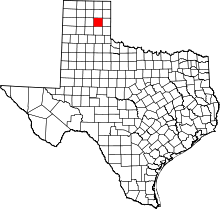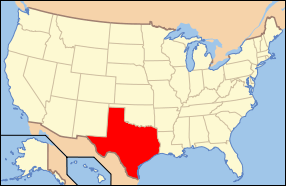Gray County, Texas
| Gray County, Texas | |
|---|---|
|
The Gray County Courthouse | |
 Location in the U.S. state of Texas | |
 Texas's location in the U.S. | |
| Founded | 1902 |
| Named for | Peter W. Gray |
| Seat | Pampa |
| Largest city | Pampa |
| Area | |
| • Total | 929 sq mi (2,406 km2) |
| • Land | 926 sq mi (2,398 km2) |
| • Water | 3.4 sq mi (9 km2), 0.4% |
| Population | |
| • (2010) | 22,535 |
| • Density | 24/sq mi (9/km²) |
| Congressional district | 13th |
| Time zone | Central: UTC-6/-5 |
| Website |
www |
Gray County is a county located in the U.S. state of Texas. As of the 2010 census, its population was 22,535.[1] The county seat is Pampa.[2] The county was created in 1876 and later organized in 1902.[3] is named for Peter W. Gray,[4] a Confederate lawyer and soldier in the American Civil War.
Gray County comprises the Pampa, TX Micropolitan Statistical Area.
Gray County was the center of the White Deer Lands Management Company, which ceased operations in 1957. The history of the company is the theme of the White Deer Land Museum in Pampa, but company archives are at the Panhandle-Plains Historical Museum in Canyon. Timothy Dwight Hobart, the White Deer land agent from 1903 to 1924, was elected mayor of Pampa in 1927.
The Clinton-Oklahoma-Western Railroad Company of Texas served Gray County with service to Hemphill County at the Oklahoma border. Another line then connected eastward to Clinton, Oklahoma. There was an eleven-mile extension of the COW-T from rural nHeaton to the former oil camp of Coltexo in Gray County.[5] Originally a Frank Kell property, the COW-T was acquired in 1928 by the Atchison, Topeka and Santa Fe Railway, which then leased it in 1931 to the former Panhandle and Santa Fe Railway.[6]
Geography
According to the U.S. Census Bureau, the county has a total area of 929 square miles (2,410 km2), of which 926 square miles (2,400 km2) is land and 3.4 square miles (8.8 km2) (0.4%) is water.[7]
Major highways
Adjacent counties
- Roberts County (north)
- Wheeler County (east)
- Donley County (south)
- Carson County (west)
- Hemphill County (northeast)
- Hutchinson County (northwest)
- Collingsworth County (southeast)
National protected area
Demographics
| Historical population | |||
|---|---|---|---|
| Census | Pop. | %± | |
| 1880 | 56 | — | |
| 1890 | 203 | 262.5% | |
| 1900 | 480 | 136.5% | |
| 1910 | 3,405 | 609.4% | |
| 1920 | 4,663 | 36.9% | |
| 1930 | 22,090 | 373.7% | |
| 1940 | 23,911 | 8.2% | |
| 1950 | 24,728 | 3.4% | |
| 1960 | 31,535 | 27.5% | |
| 1970 | 26,949 | −14.5% | |
| 1980 | 26,386 | −2.1% | |
| 1990 | 23,967 | −9.2% | |
| 2000 | 22,744 | −5.1% | |
| 2010 | 22,535 | −0.9% | |
| Est. 2015 | 23,210 | [8] | 3.0% |
| U.S. Decennial Census[9] 1850–2010[10] 2010–2014[1] | |||
As of the census[11] of 2000, there were 22,744 people, 8,793 households, and 6,049 families residing in the county. The population density was 24 people per square mile (9/km²). There were 10,567 housing units at an average density of 11 per square mile (4/km²). The racial makeup of the county was 82.15% White, 5.85% Black or African American, 0.94% Native American, 0.39% Asian, 0.02% Pacific Islander, 8.23% from other races, and 2.42% from two or more races. 13.01% of the population were Hispanic or Latino of any race.
There were 8,793 households out of which 30.00% had children under the age of 18 living with them, 57.00% were married couples living together, 9.00% had a female householder with no husband present, and 31.20% were non-families. 28.70% of all households were made up of individuals and 15.30% had someone living alone who was 65 years of age or older. The average household size was 2.39 and the average family size was 2.93.
In the county, the population was spread out with 24.00% under the age of 18, 8.40% from 18 to 24, 27.20% from 25 to 44, 22.30% from 45 to 64, and 18.10% who were 65 years of age or older. The median age was 39 years. For every 100 females there were 104.00 males. For every 100 females age 18 and over, there were 103.70 males.
The median income for a household in the county was $31,368, and the median income for a family was $40,019. Males had a median income of $32,401 versus $20,158 for females. The per capita income for the county was $16,702. About 11.20% of families and 13.80% of the population were below the poverty line, including 17.60% of those under age 18 and 9.60% of those age 65 or over.
Communities
City
- Pampa (county seat)
Town
Unincorporated community
See also
- List of museums in the Texas Panhandle
- National Register of Historic Places listings in Gray County, Texas
- Phil Cates, state representative from 1971 to 1979, born in Pampa in 1947[12]
- Tom Mechler, state Republican Party chairman since 2015; former Gray County Republican chairman
- Kae T. Patrick, native of Gray County who served in the Texas House of Representatives from San Antonio from 1981 to 1988
References
- 1 2 "State & County QuickFacts". United States Census Bureau. Retrieved December 16, 2013.
- ↑ "Find a County". National Association of Counties. Retrieved 2011-06-07.
- ↑ "Texas: Individual County Chronologies". Texas Atlas of Historical County Boundaries. The Newberry Library. 2008. Retrieved May 23, 2015.
- ↑ Gannett, Henry (1905). The Origin of Certain Place Names in the United States. Govt. Print. Off. p. 142.
- ↑ "Coltexo, Texas". tshaonline.org. Retrieved April 27, 2013.
- ↑ "Clinton-Oklahoma-Western Railroad". tshaonline.org. Retrieved April 27, 2013.
- ↑ "2010 Census Gazetteer Files". United States Census Bureau. August 22, 2012. Retrieved April 27, 2015.
- ↑ "County Totals Dataset: Population, Population Change and Estimated Components of Population Change: April 1, 2010 to July 1, 2015". Retrieved July 2, 2016.
- ↑ "U.S. Decennial Census". United States Census Bureau. Retrieved April 27, 2015.
- ↑ "Texas Almanac: Population History of Counties from 1850–2010" (PDF). Texas Almanac. Retrieved April 27, 2015.
- ↑ "American FactFinder". United States Census Bureau. Retrieved 2011-05-14.
- ↑ "Phil Cates". Texas Legislative Reference Library. Retrieved June 29, 2015.
External links
- Gray County government's website
- Gray County from the Handbook of Texas Online
- Gray County Profile from the Texas Association of Counties
| Wikimedia Commons has media related to Gray County, Texas. |
 |
Roberts County |  | ||
| Carson County | |
Wheeler County | ||
| ||||
| | ||||
| Donley County |
Coordinates: 35°25′N 100°49′W / 35.41°N 100.81°W
